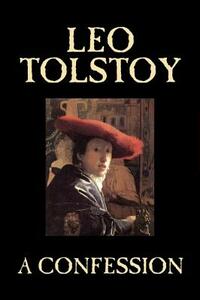You need to sign in or sign up before continuing.
Take a photo of a barcode or cover
dark
emotional
reflective
tense
medium-paced
A cure for suicide, or at least Tolstoy's response to despair.
It may also be a cure for you.
It may also be a cure for you.
A short read but a necessary read, nonetheless. It is as am I embarking on a spiritual journey through different thought and Tolstoy's own brand of Anarchist Christianity called to me, as did seeing and reading his own journey to find faith, to find peace in his life. Tolstoy's confessions are maybe universal to people seeking knowledge in a world of skepticism and in world of suffering and unending pain, war, and so on. And even Tolstoy, as of my understanding of this, doesn't always get answers to his questions and his questions persist onward throughout his journey of faith but the 1882 ending to it, however, suggests he finds some peace and that all will be okay. It shows understanding and compassion and a person's struggle to find meaning in life. Not the meaning of life, but meaning in one's life nonetheless. And that, to me, is rather beautiful and even noble.
challenging
informative
reflective
tense
fast-paced
Such a raw, honest document from a great mind like Tolstoy. You can really sense the existential turmoil he went through while writing this essay.
reflective
medium-paced
من ترجمه آبتین گلکار رو خوندم
و این ستاره هارو کامل ندادم چون نخوندم این ترجمه رو
خیلی کتابی عجیبی بود اولش برام و بعد فهمیدم خیلی دوستش دارم
و این ستاره هارو کامل ندادم چون نخوندم این ترجمه رو
خیلی کتابی عجیبی بود اولش برام و بعد فهمیدم خیلی دوستش دارم
challenging
reflective
slow-paced
reflective
"I shall not seek the explanation of everything. I know that the explanation of everything, like the commencement of everything, must be concealed in infinity."
Tolstoy's exploration on faith as the search for a connection between finite and infinite, man and the world, reminded me of Camus and the absurd. The inherent desire to relate to the space one inhabits is satisfied by religion which aims to rationalize with the help of the irrational. Religion may acknowledge science but in the way that science is incapable of attributing meaning to life: it aims to solve life, something the soul cannot be satisfied with. Therefore religion employs God, an impossible force which is unjust and incomprehensible, which allows people to shape their own belief.
The absurd man is not necessarily religious but the religious man appears to be absurd; he seeks to attribute a meaning to life and therefore personifies his meaning as God. God, who is infinite and cannot be solved as He is not rational, aids men through life by letting them believe that He will welcome them after death. However, God, too, ends after death since He exists within the mind. As Tolstoy argues that there can be faith without God but no God without faith, it is the individual who creates meaning for themselves since it resides within them, ever present.
A Confession is a short, insightful read which is worth it even if you're an atheist- in fact, I am never more assured of my non-belief than when I read about people writing about religion. Tolstoy's prose is beautifully eloquent and he possesses a great insight into how people (struggle to) apply faith to their search for meaning. Three hallelujahs or whatever they say.
Tolstoy's exploration on faith as the search for a connection between finite and infinite, man and the world, reminded me of Camus and the absurd. The inherent desire to relate to the space one inhabits is satisfied by religion which aims to rationalize with the help of the irrational. Religion may acknowledge science but in the way that science is incapable of attributing meaning to life: it aims to solve life, something the soul cannot be satisfied with. Therefore religion employs God, an impossible force which is unjust and incomprehensible, which allows people to shape their own belief.
The absurd man is not necessarily religious but the religious man appears to be absurd; he seeks to attribute a meaning to life and therefore personifies his meaning as God. God, who is infinite and cannot be solved as He is not rational, aids men through life by letting them believe that He will welcome them after death. However, God, too, ends after death since He exists within the mind. As Tolstoy argues that there can be faith without God but no God without faith, it is the individual who creates meaning for themselves since it resides within them, ever present.
A Confession is a short, insightful read which is worth it even if you're an atheist- in fact, I am never more assured of my non-belief than when I read about people writing about religion. Tolstoy's prose is beautifully eloquent and he possesses a great insight into how people (struggle to) apply faith to their search for meaning. Three hallelujahs or whatever they say.





